
7 Best Grow Tents for Mushrooms To Buy In 2023
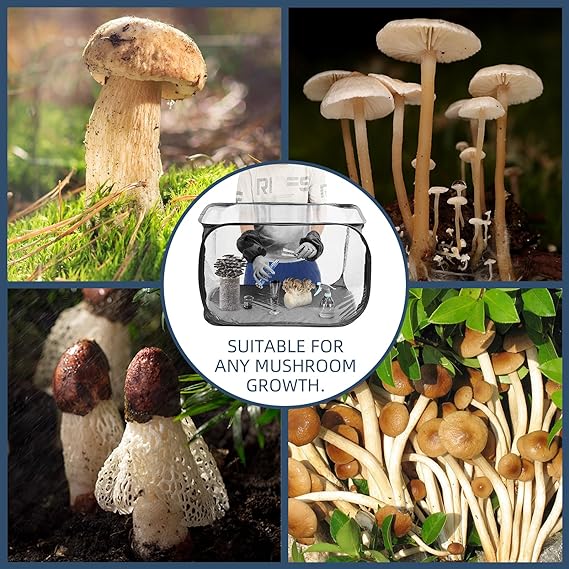
Growing mushrooms at home has become increasingly popular, offering both a fun hobby and a sustainable way to produce your own food. A critical component of mushroom cultivation is the grow tent, a controlled environment that facilitates the growth of mushrooms. In this review, we delve into the 7 best grow tents for mushrooms, focusing on their features, pros, cons, and suitability for different types of mushroom growers.
Tips Choosing a Grow Tent for Mushrooms
Here are some tips to consider when choosing a grow tent for mushroom cultivation:
- Size and Space: Consider the space you have available and how much you want to cultivate. Grow tents come in various sizes, so choose one that fits your space without overcrowding the area. Remember, you’ll need additional space for equipment and moving around.
- Material Quality: Look for tents made with durable, tear-resistant materials. Higher density fabrics, like 600D canvas, are often more durable and light-proof. The material should also be non-toxic and safe for growing edible mushrooms.
- Light Proofing and Reflectivity: Although mushrooms don’t require light for growth, a light-proof tent is essential to control the environment fully. The interior should have a reflective lining to distribute any light evenly, beneficial if you’re also growing other plants or using lights for temperature control.
- Ventilation and Airflow: Proper ventilation is crucial for maintaining the right humidity and temperature. Look for tents with multiple vent options and the ability to install a filtration system. Good airflow prevents the buildup of excess moisture and potential mold growth.
- Portability and Assembly: If you plan to move your tent or disassemble it between growing cycles, look for a model that’s easy to assemble and disassemble. Portability can also be a factor if you’re limited in permanent space.
- Access Points: Multiple doors and access windows can be beneficial for easy maintenance and monitoring of your mushrooms without disturbing the environment too much.
- Price: Determine your budget beforehand. While higher-priced tents often offer better quality and durability, there are affordable options that can suit beginners and those not looking to invest heavily.
- Hygiene and Cleaning: Check if the tent is easy to clean and maintain. A clean environment is critical for mushroom cultivation to prevent contamination and disease.
- Customization: Some tents offer customizable options like removable floors, adjustable shelves, and varying heights. These features can be very useful as your mushroom growing expertise grows.
- Manufacturer Reputation and Warranty: Finally, consider the reputation of the manufacturer and the warranty offered. A good warranty can be a lifesaver if you encounter any issues with your tent.
Remember, the right grow tent for you depends on your specific needs, space, and the type of mushrooms you plan to grow. Happy mushroom farming!
Types of Grow Tents for Mushrooms
Here are some types of grow tents that are particularly suitable for mushroom cultivation:
- Basic Grow Tents: These are standard, entry-level grow tents that are ideal for beginners or hobbyists. They are usually made of a light-proof and tear-resistant material like Mylar and feature a simple, box-like structure with a zippered door for access. They’re great for small-scale mushroom cultivation.
- Hydroponic Grow Tents: Though primarily designed for hydroponic plant growing, these tents can be adapted for mushroom cultivation. They often come with features like built-in fans and filters, which can be beneficial for maintaining the ideal humidity and temperature for mushrooms.
- Multi-Chamber Grow Tents: These tents have separate sections or chambers, allowing you to create different environments for various stages of mushroom growth. This can be especially useful if you’re growing several types of mushrooms with different environmental needs.
- Reflective Grow Tents: These tents have a highly reflective interior, usually with Mylar or another reflective material. While mushrooms don’t require light for growth, the reflective interior can help maintain stable temperatures and distribute any ambient light evenly.
- Heavy-Duty Grow Tents: Built with extra-durable materials and reinforced construction, these tents are designed for longevity and extensive use. They’re suitable for more serious mushroom cultivators who need a robust and long-lasting environment.
- Portable/Compact Grow Tents: Ideal for those with limited space, these smaller tents are easy to set up and take down, making them perfect for growers who might need to move their setup occasionally.
- Customizable Grow Tents: Some tents offer customizable features, such as adjustable shelving, removable floors, and variable ventilation systems. These are great for growers who want to tailor their growing environment closely to their mushrooms’ specific needs.
Each type of grow tent has its unique advantages and can be chosen based on the scale of cultivation, budget, space availability, and specific requirements of the mushrooms being grown.
7 best Grow Tents for Mushrooms
1. Mushroom Master Pro Grow Tent
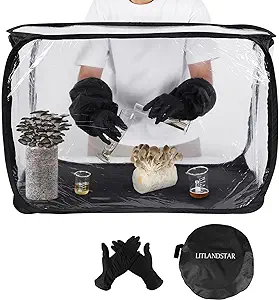
- Size: 48″x48″x80″
- Material: 600D Canvas
- Price: $120
Pros:
- Sturdy and durable
- Easy to assemble
- Great ventilation
Cons:
- Higher price point
Best For: Enthusiasts who are serious about mushroom growing and want a long-term investment.
2. Fungi Farm Mini Tent
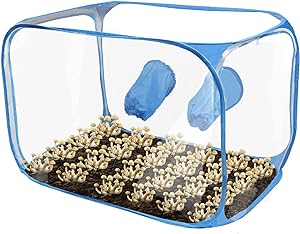
- Size: 24″x24″x48″
- Material: Reflective Mylar
- Price: $80
Pros:
- Compact and great for small spaces
- Reflective interior for better light distribution
Cons:
- Limited space for larger mushroom varieties
Best For: Beginners or those with limited space.
3. Shroom Shack Large Capacity

- Size: 60″x60″x78″
- Material: Tear-proof Mylar
- Price: $150
Pros:
- Spacious
- Durable material
Cons:
- Requires more space and higher initial setup cost
Best For: Experienced growers looking to cultivate larger quantities.
4. EcoGrower Mushroom Haven

- Size: 36″x36″x72″
- Material: Eco-friendly fabric
- Price: $100
Pros:
- Environmentally friendly materials
- Moderate size for versatility
Cons:
- Less durable than others
Best For: Environmentally conscious growers.
5. MycoMini Compact Grow Tent
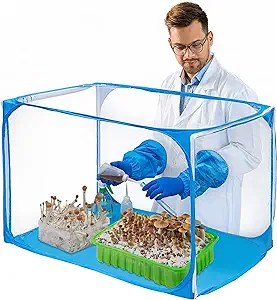
- Size: 18″x18″x24″
- Material: 210D Canvas
- Price: $50
Pros:
- Extremely affordable
- Ideal for micro-scale growing
Cons:
- Too small for some growers
Best For: Hobbyists or those experimenting with mushroom cultivation.
6. Mushroom Maximizer
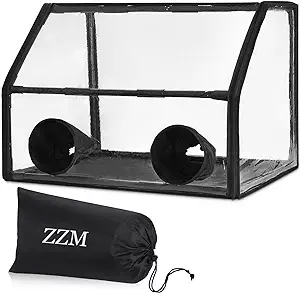
- Size: 48″x24″x60″
- Material: Heavy-duty Mylar
- Price: $110
Pros:
- Unique shape for different growing setups
- Sturdy construction
Cons:
- Slightly complex setup
Best For: Growers who want versatility in their growing setup.
7. UrbanShroom Indoor Kit

- Size: 32″x32″x63″
- Material: Mylar and Canvas mix
- Price: $90
Pros:
- Good balance of size and price
- Easy to set up
Cons:
- Not as robust as higher-end models
Best For: Urban dwellers or those new to mushroom growing.
Important Note:
“When choosing a grow tent for mushrooms, consider factors such as size, material, ventilation, and light distribution. The right choice depends on your space, budget, and the scale of your mushroom cultivation project.”
This review aims to guide consumers through the diverse range of grow tents available, helping you make an informed decision based on your unique mushroom growing needs. Happy mushroom cultivation!
FAQs
Here are some frequently asked questions about using a grow tent for mushroom cultivation:
- What is a grow tent for mushrooms?
A grow tent for mushrooms is a controlled, enclosed space designed to create an optimal environment for growing mushrooms. It helps regulate factors like temperature, humidity, and air circulation. - Why use a grow tent for growing mushrooms?
A grow tent allows for precise control over the growing environment, which is crucial for mushroom cultivation. It helps maintain consistent humidity and temperature, which are vital for successful mushroom growth. - What size grow tent do I need for mushrooms?
The size of the grow tent depends on the amount of space you have and the scale of your mushroom cultivation. Smaller tents are suitable for personal use, while larger tents are better for commercial or large-scale cultivation. - What features should I look for in a mushroom grow tent?
Key features include durable and light-proof material, proper ventilation, a reflective interior, easy assembly, and the ability to maintain consistent humidity and temperature levels. - Do mushrooms need light to grow in a tent?
Unlike plants, mushrooms do not require light for photosynthesis. However, some ambient light can be beneficial for monitoring growth and maintaining a consistent temperature inside the tent. - How do I control humidity and temperature in a mushroom grow tent?
You can control humidity using humidifiers, and temperature can be regulated with heaters or coolers. Automated systems can also be installed for precise control. - Can I grow different types of mushrooms in the same tent?
Yes, but it’s important to ensure that the environmental conditions inside the tent meet the needs of all the mushroom varieties being grown. - How often should I clean my mushroom grow tent?
Regular cleaning is essential to prevent contamination and diseases. Clean the tent between each growing cycle and whenever necessary. - Is it expensive to set up a mushroom grow tent?
The cost can vary widely based on the size and features of the tent. There are affordable options for beginners, while more advanced setups may require a higher investment. - Can I use a grow tent for mushrooms if I have limited space?
Yes, there are compact and portable grow tents available that are suitable for small spaces or even indoor environments.






